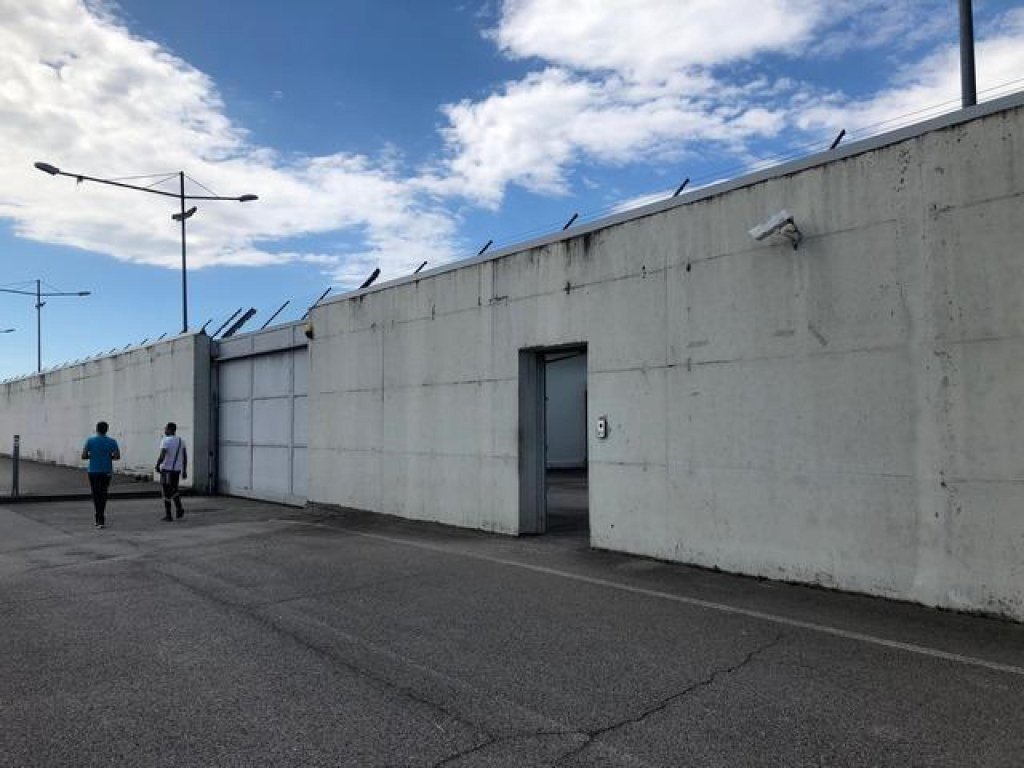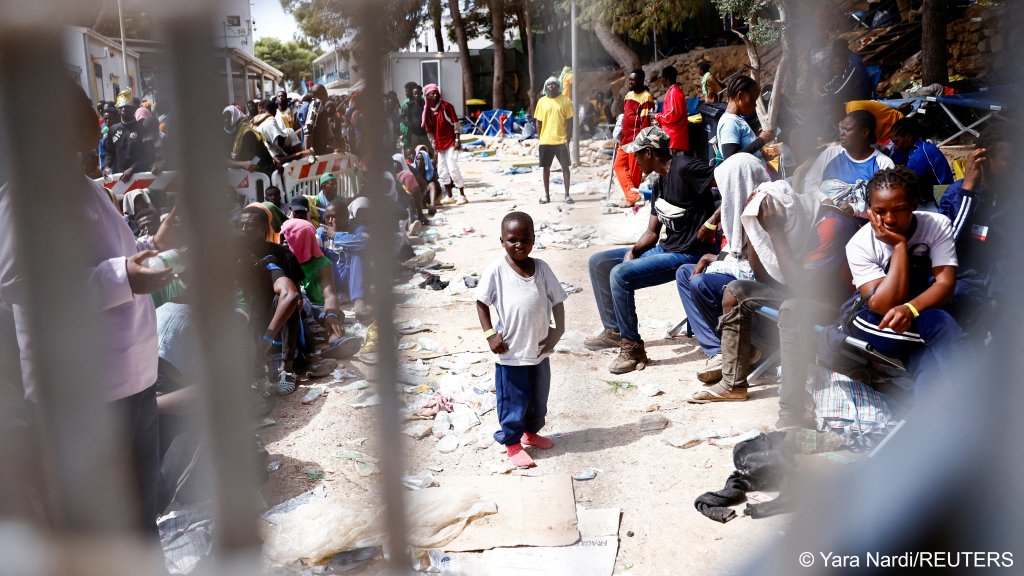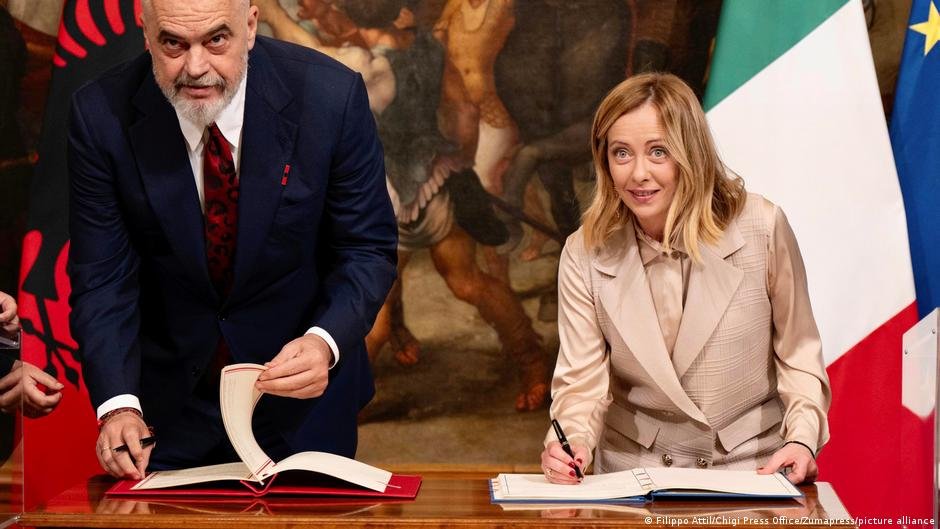Aid organizations and rights groups have called for the closure of migrant detention centers and an end to administrative detention in Italy. Eleonora Celoria, a lawyer and researcher at the migration think tank FIERI, explained to InfoMigrants the surveillance and dire living conditions faced by detainees, describing them as "worse than prison".
"If I die, I'd like my body to be returned to Africa," Ousmane Sylla wrote in French on the wall of a migrant detention center in Italy.
Sylla died by suicide in February while in detention at the Ponte Galeria migrant detention center outside Rome.
The discovery of his body unleashed a wave of grief and outrage. Other migrant detainees burned mattresses and a face off with the police ensued. Six detainees attempted suicide.

The death of Sylla, who some media outlets reported as 19 and others as 22 years old, and the chain of events that followed have led to mounting pressure to close migrant detention centers and end administrative detention for migrants in Italy.
Eleonora Celoria, a lawyer and researcher at the migration think tank Forum of International and European Research on Immigration (FIERI) in Turin, is among those advocating for the closure of migrant detention centers and an end to administrative detention. In an interview with InfoMigrants, Celoria highlighted the pressing need for reform in Italy's immigration policies.
'Worse than prison'
Unlike criminal detention, where individuals have been accused of committing a crime, administrative detention is imposed to execute deportation orders for those whose asylum claims have been rejected and for foreigners who are awaiting expulsion for criminal activity. While the paperwork for deportation makes its way through the bureaucracy, individuals are meant to stay in temporary holding facilities known as migrant detention centers. In Italy these facilities are called CPR – Centri di permanenza e rimpatrio, or Pre-Removal Centers. People can be sent here if their asylum claim has expired, or they did not come to Italy to seek asylum.
"It is basically to ensure that you serve out your expulsion order. That you don't abscond," said Celoria.
According to Celoria, the living conditions inside these detention centers are deplorable and the surveillance is "worse than prison".

Heavily armed guards and police patrol the centers. Movements are watched and access to everyday necessities like food and water is regulated, she said.
"Prison has the goal of rehabilitation and integration into society. There are specific programs and services for people deprived of liberty to meet this goal. But at migrant detention centers, you are just waiting to serve an expulsion order. There are no programs or services. A lot of the migrants spend much of their time doing nothing," said Celoria.
Celoria stressed that those detainees whose asylum claims had been rejected had not committed a crime.
''The migrants I have spoken to in these centers always ask, 'What did I do to deserve this?'''
"Administrative detention is unlawful violence against migrants. And it doesn't work," she said.
According to Celoria, out of the 6,383 migrants detained in 2022, only 3,154 or less than 50% returned to their country of origin.
Other alternatives such as retention of travel documents would be more effective at ensuring execution of deportation orders than administrative detention. In parallel, a faster regularization of migration status would be a more humane approach.
Extending detention time, externalizing detention
In recent decrees issued last year, the Italian government extended the maximum detention period of 18 months.
Additionally, last month, Albania's parliament recently ratified a migration deal with Italy, allowing Italy to establish two processing centers for migrants within Albanian territory. Despite opposition and criticism from rights groups, the deal received approval from 77 out of 140 legislators.
The five-year agreement allows Italy to operate two camps in Albania. One camp will be dedicated to screening migrants upon their arrival, while the other will detain them during the processing of their asylum applications. After screening, migrants will either be permitted entry into Italy or returned to their country of origin.

These camps are designed to accommodate up to 3,000 migrants each. Given that asylum processing typically takes around a month, the agreement could potentially result in the transfer of up to 36,000 asylum seekers to Albania annually.
"Other countries will be watching how the deal to with Albania is executed and see how it can possibly be replicated," said Celoria.
European countries have been highly criticized for outsourcing their migration policies to other countries, particularly those with questionable human rights records.
Several aid organizations have reported cases of harassment from the Libyan Coast Guard when conducting rescue operations at sea. Libya, bolstered by funding from the European Union, has been help stem irregular arrivals into the bloc for more than five years.
Meanwhile, the UK is reportedly preparing a 'voluntary' departure scheme where migrants will be offered thousands to move to Rwanda.
Also read: UK: Government plans to send migrants to Rwanda under voluntary scheme
Symbolic measures to thwart irregular migration
The extension of the administrative detention period, the majority of those held at centers being male, and the militarized surveillance all point to a symbolic but clear message from the Italian government.
"It is to show that adult male migrants kept in administrative detention are dangerous. And for those who are thinking of coming here, the message is clear: If you do, you will be punished," said Celoria.
Also read: Italy hands over patrol boat to Libyan government - InfoMigrants
